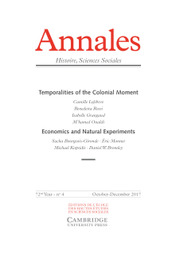No CrossRef data available.
Article contents
Reinterpreting Social Status
Published online by Cambridge University Press: 20 January 2017
Extract
Social statuses existed before the social sciences. When scholars began to develop this concept in the nineteenth century, they were drawing on the juridical writings of the seventeenth and eighteenth centuries and, more broadly, the vocabulary used by social groups to define themselves across time and space. From this moment forward, social statuses occupied a central position in the work of historians, sociologists, and anthropologists. These scholars were aiming to describe and explain the dynamics of human societies, but they also participated in framing the debates at the heart of the social sciences—as attested by the recurrent disputes between a Marxian notion of class and a Weberian conception of status groups, particularly among readers with tacit political motivations. Max Weber played a fundamental part in the success of the concept, taking the juridical aspect and the idea of society as a body, inherited from the ancien régime, and adding a specifically sociological content relating to the hierarchy of social prestige, which is neither directly inherited (as with castes) nor purely economic (as with classes). In truth, this definition was rarely applied stricto sensu by historians, sociologists, and anthropologists, but it did allow for the elaboration of a concept that could delimit groups of individuals sharing legal and symbolic characteristics within a given society, and that could incorporate the categories used by social actors themselves into historical analysis. Thus, during the 1960s, it was around the notion of status that interpretations of the ancien régime as a society of orders or a society of classes took shape, while anthropologists began to consider notions of emic and etic. From the 1980s, however, the concept of social status receded into the background as the idea of a global interpretation of society by the social sciences was called into question.
- Type
- Social Statuses
- Information
- Annales. Histoire, Sciences Sociales - English Edition , Volume 68 , Issue 4 , December 2013 , pp. 607 - 613
- Copyright
- Copyright © Les Éditions de l’EHESS 2013
References
1. The concept of social status, along with the terminology used to express and analyze it, has developed in a number of different ways, depending on geographical, institutional, and disciplinary contexts. Notably, Francophone and Anglophone scholarship have both built up rich, frequently divergent, traditions. This introduction, like the issue of the Annales that it prefaces, engages with a particular critical genealogy. To reflect this, we have used the terms social status and social statuses to translate the French statut social and statuts sociaux throughout the issue. Their usage should be understood in the context of the evolutions laid out in this introduction.—Annales.
Linked content
This is a translation of: Repenser les statuts sociaux




